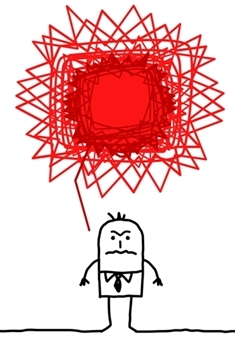Free yourself from the bondage of toxic anger
By Ellen Katz


Bullying. Stewing. Withholding. Pouting. Ranting. These are all varieties of intoxicating anger. During our childhoods, whether we witnessed or received toxic anger, we internalized everything. If we were bullied emotionally or physically, we either bully ourselves or stuff our rage. If we witnessed blaming or shaming, we probably do it, too.
No emotion is intrinsically bad; some just aren’t productive. Anger can motivate us to do better, but as a reaction, it causes pain.
The most common forms of prolonged anger make us sick. Resentment, self-pity, rage, contempt and righteous indignation can increase hormonal cortisol levels, weaken our immune system, lead to a decrease in our libido and encourage our bodies to hold on to extra weight, all the while eroding our attitudes, relationships and self-esteem.
The Big Book of Alcoholics Anonymous portrays anger as a liability, an emotion that threatens our recovery. Going beyond the tip of the iceberg of addiction we can investigate our process addictions or attachments to thoughts and behaviors that produce intoxicating emotions. We can become dry drunks without ingesting a thing.
Toxic anger can show up in a rush, or it can creep insidiously under our radar. Once it strikes, we slip into the bondage of self, running thoughts that blame or look for a fix. Immediately after the triggering event, urgent emotions seethe through our bodies.
It is most devastating when we’ve been doing our work — we’ve prayed, meditated, taken direction, stayed abstinent — and still we are consumed by this intense emotion.
Become the Witness
We can’t change anything unless we can see it. When we are emotionally triggered, we no longer see through sober eyes; we identify with our emotions and cling to them, seduced by the beliefs that our “pain body” creates and recycles.
Eckhart Tolle, in his book A New Earth, refers to the pain body as an energy field made up of our accumulated emotional scars from past betrayals, abandonments, disappointments and violations. Like a lens, it alters our perceptions. Essentially we are groomed by our conscious and unconscious painful memories to interpret present-time events as personal threats. When this happens, the mind stirs up emotional cocktails of indignation, anger, resentment, self-pity, shame and fear. The mind feeds the pain body, and our toxic anger thrives.
The good news is that beyond the pain body is a witness, a part of us that is our unwavering self and always present. It can see the pain body churning out stressful thoughts, and it is aware of the toxic emotions that the pain body generates. Because it can witness the pain body, it can question the validity of the thoughts that the pain body emits. This is the part of ourselves to which we want to learn to relate.
The witness knows the truth: We are the executive directors of our own lives, and in every oment we have the power and the freedom to choose which beliefs we are going to feed. The witness can change our awareness and remind us to notice the emotional fallout of our thoughts. The mere act of recognizing the pain body’s role in our anger prompts a radical shift — critical if we want to break the addictive cycle of anger.
More good news is that the pain body diminishes when it gets positive attention, like a devastated child quiets down when held gently and consistently with acceptance and kindness. By watching the pain body, understanding its roots, allowing its energy to move through the physical body and not judging but accepting it, the pain body fades. Through this practice, we develop compassion for our past selves.
Just Breathe
Just breathing — slowly, deeply and mindfully — changes our brain chemistry. Inhaling and releasing three to five breaths slowly and deliberately increases production of the neurotransmitter serotonin, which gives us a sense of well-being and helps us to be present. Pausing allows us to make the shift into emotional neutrality and reverse old, reactive behaviors.
Say a Little Prayer
Once we quiet our pain body, we can choose any number of positive options. For example, we could decide to work the steps by asking our higher power to remove our “stinking thinking,” subject our thoughts to critical inquiry or imagine giving our burdening thoughts away. We could repeat an affirmation such as, “I am safe, whole and complete” or a mantra such as “Om Gum Ganapataye Namaha,” which is Sanskrit for, “I invoke God, the remover of obstacles, to intervene on my behalf for the highest good.”
We can connect with someone who understands that prolonged complaining only feeds our pain body. Instead, we can own it by saying, “I’m stuck in a resentment story,” or “I’m in an emotional relapse.” Use the Buddhist practice of invoking the image of holding the stressful emotion like a baby, gently containing and soothing it. Another choice is to offer ourselves healing touch: one hand gently on the belly and another on the heart, while quietly repeating, “infinite love and gratitude.”
Yoga, stretching and exercise are options that let our minds rest while focusing. We can contemplate what an attitude adjustment would look like or what gratitude, compassion, understanding or empathy would feel like.
Toxic anger depletes our energy and offers only a pseudo sense of power. Discovering real power — our ability to witness, pause and choose — allows our self-esteem and integrity to grow. Anger is in fact a gift when it prompts our mindful action.
By taking the challenge to engage with ourselves in this way, we finally befriend what we once judged as unacceptable. This is self-love.
Ellen Katz has been a psychotherapist for more than 30 years. Her passion for recovery began over 25 years ago along with her own immersion in Twelve Step practice, meditation and yoga. Katz is on the faculty of the Infinity Foundation, Common Ground and Inner Balance — all in the greater Chicago area.



No responses yet